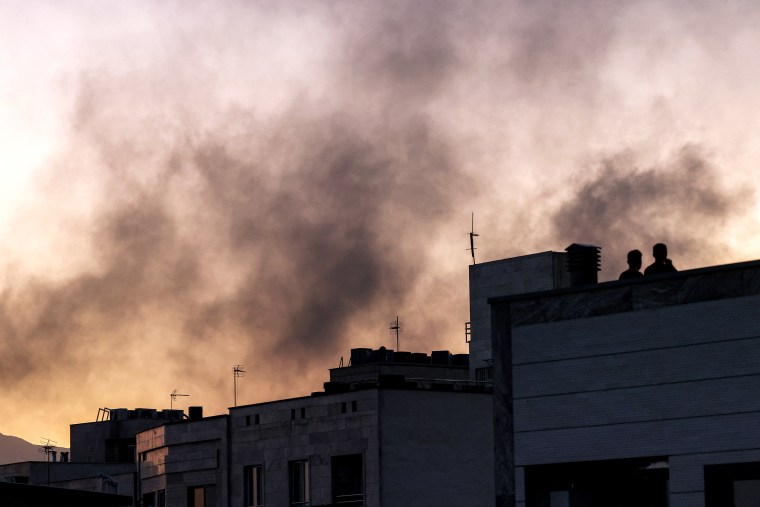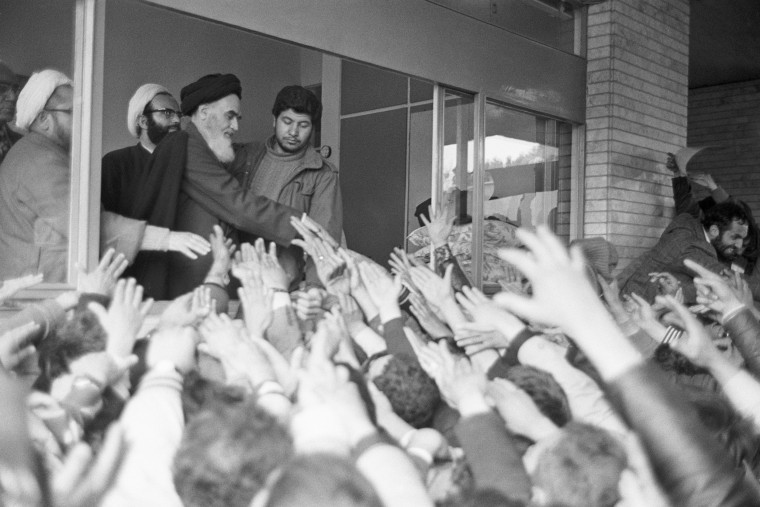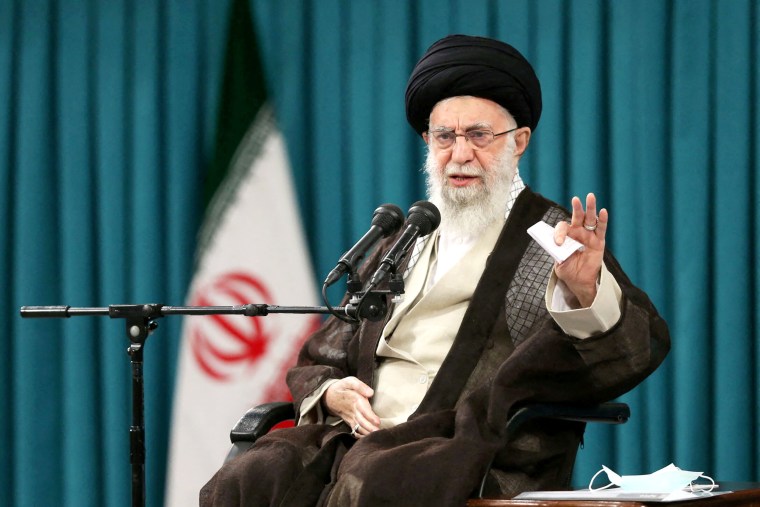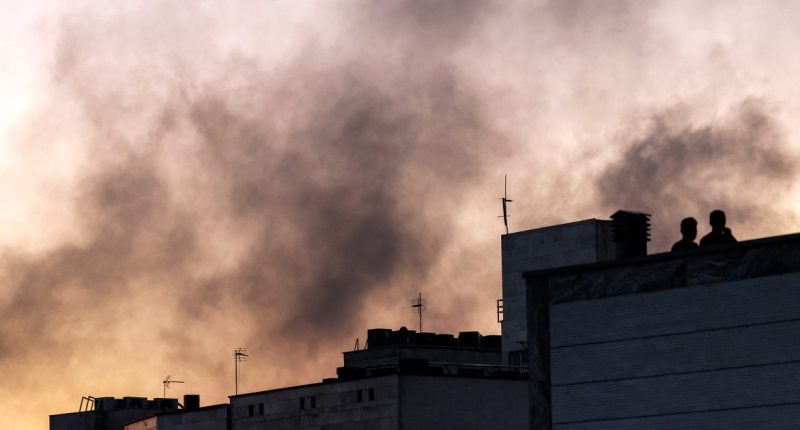Share this @internewscast.com
Following targeted attacks on prominent Iranian military figures, Israeli Prime Minister Benjamin Netanyahu suggests that Israel’s airstrikes might destabilize Iran’s regime, potentially leading to a grassroots rebellion.
“While it’s hard to foresee, such a major shift could result from our significant actions,” Netanyahu mentioned to journalists. “We are reshaping the Middle East landscape.”
However, experts on Iranian affairs and former officials from the U.S. and Israel believe this outcome is improbable. Despite its unpopularity, Iran’s theocratic regime still maintains a strong control without any organized group ready to take power. Moreover, any potential leadership change might not emerge from a public upheaval but rather from an internal coup, which could lead to an even stricter regime.
Still, the Iranian government is struggling to cope with the attacks. Some experts say that even if Israel’s onslaught does not topple the regime, it could inflict permanent damage, leaving it in a weakened state that could embolden opposition activists or fuel internal power struggles inside the theocratic system.
After having initially targeted nuclear and missile sites at the start of its air campaign last week, Israel has expanded its target list to include oil facilities, police headquarters and the state television center — all representing crucial elements of the government’s political and economic power.

“They’re going after the apparatus of repression inside the regime,” said Mark Dubowitz, CEO of the Foundation for Defense of Democracies, a think tank that has called for imposing tougher sanctions and other measures against Iran.
If they weaken the security services used to crush dissent in Iran, the strikes could open up more space for opponents of the regime, Dubowitz said.
“I think their hope is we can undermine and distract the security forces and have Iranians take to the streets, as they’ve been for many years now, and take back their country,” he said. “It’s one of the key pillars of the Israeli strategy.”
Wary of foreign interference
But Israeli missiles may not be the ideal vehicle for overturning Iran’s authoritarian rule, experts said.
Hamidreza Azizi, a former professor at Iran’s Shahid Beheshti University who is now a visiting fellow at the German Institute for International and Security Affairs, said that several days into the conflict, “we still see no sign of a popular uprising against the government.”
On the contrary, Azizi said, “images of devastation in civilian areas and the deaths of innocent people are making Iranians — who are inherently patriotic and emotionally connected to their nation — quite uneasy about Israel’s ultimate intentions.”
Suzanne Maloney, who has written about Iran’s politics and advised previous U.S. administrations, said the Iranian people’s dissatisfaction with the regime is also coupled with deep national pride and a wariness of foreign interference.
“Iranians are very well understood to resent their government. They’re deeply critical of its failures, both in terms of how it has governed the country and how it has represented their interests on the world stage,” said Maloney, a vice president at the Brookings Institution think tank. “But they also are fiercely nationalistic.”
Given Iran’s bitter experience with foreign meddling, distrust of outside powers is pervasive, and it is a “third rail” in Iranian politics since a U.S.-British coup toppled a democratically elected prime minister in 1953, she said.
Since it came to power in the 1979 revolution that toppled the country’s pro-Western monarch, the Islamic Republic has a long record of repression, using its security services to crush protests and imprison dissidents.
The government is also struggling to contain rising discontent over the ailing economy, which has been plagued by rampant inflation and financial misery for millions of Iranians, according to regional analysts and Western diplomats. Officials in Tehran have blamed U.S. sanctions for the economic troubles.

Every few years, popular anger erupts in the streets. Most recently, demonstrators vented their outrage after the killing of Mahsa Amini, who died in a hospital in 2022 after the country’s morality police arrested her for not adhering to the country’s dress code, which requires women to conceal their hair and the shapes of their bodies.
Iranian opponents of the regime have had mixed reactions to the Israeli strikes.
Reza Pahlavi, the eldest son of the deposed shah, who ruled Iran for four decades until he was forced out by mass street protests in 1979, said that the regime in Tehran was “at its weakest point” and that Iranians now had an opportunity to secure democratic rule. “Now is our moment,” he said on X.
Several prominent Iranian activists and filmmakers, including Nobel laureates Shirin Ebadi and Narges Mohammadi, wrote an op-ed calling for an immediate end to the fighting and demanded that the Iranian government halt uranium enrichment work.
The group also denounced attacks on civilians by both Iran and Israel and called for a transition to democracy in Iran.
“Deeply committed to Iran’s territorial integrity and the inalienable right of its people to self-determination under genuine sovereignty, we believe that continuing uranium enrichment and the devastating war between the Islamic Republic and the Israeli regime neither serves the Iranian people nor humanity at large,” it said.
It added: “Iran and its people should not be sacrificed for uranium enrichment and the ambitions of the Islamic Republic.”
Imprisoned reformist Mostafa Tajzadeh — an ardent critic of Iran’s supreme leader, Ayatollah Ali Khamenei — has condemned Israel’s barrage, arguing it did not offer a legitimate way to oust the regime.
“I know that some sections of the people are happy with these attacks, because they see them as the only way to change the failed clerical government,” Tajzadeh said in a letter from prison, according to Gooya, a Persian-language news website based in Belgium. “But even if the war leads to such an outcome, Iran will be left in ruins, where most likely statelessness and chaos will prevail.”
Tajzadeh, who was deputy interior minister more than 20 years ago and has favored a rapprochement with the West, called Israel’s strikes “the aggression of a foreign army, on the orders of someone who has been accused of war crimes” — referring to Netanyahu — which, “in my opinion, lacks political and moral justification and has no precedent in post-constitutional Iran.”
So far, there have been no signs of major defections from the country’s political leadership, and most Iranians are focused on trying to seek safety amid daily bombing raids from Israel, said Karim Sadjadpour, a senior fellow at the Carnegie Endowment for International Peace.
“I think people are under aerial bombardment, and they’re just thinking about staying alive and staying safe, staying secure. They’re not thinking about waging political protests,” he told MSNBC.
Although an overwhelming majority of Iranians reject the government’s rule, there is no opposition in waiting, and the regime remains heavily armed and organized, Sadjadpour said. “At the moment, they probably are calculating ‘kill or be killed,’” he said. “And they have their fingers on the trigger right now.”
Regime change
Unlike their Israeli counterparts, President Donald Trump and his top aides have not encouraged the Iranian people to rise up or invoked the idea of ousting the regime. During his first term, Trump’s deputies expressed solidarity with the Iranian people and privately argued that economic sanctions could cause the regime to unravel.
But Trump and his current Cabinet are outspoken critics of previous U.S. attempts at “regime change” in Iraq and elsewhere, and some of Trump’s supporters worry the United States could be drawn into another military intervention in the Middle East.
Daniel Shapiro, a senior fellow at the Atlantic Council think tank who was U.S. ambassador to Israel during the Biden administration, said Israel should stick to a more realistic goal of disabling Iran’s nuclear and missile programs and steer clear of trying to shape Iran’s internal politics.

“There are certainly plausible scenarios where this becomes a regime-threatening event, but I don’t think it’s imminent, and I don’t think it should be the goal of the military campaign,” Shapiro said.
An attempt to change the regime would be a “massive undertaking” that would depend on factors beyond the control of any outside power, he said.
“That’s a recipe for overreach and for getting drawn into a lengthy and potentially fruitless kind of military engagement. The memory is very heavy of what happened to us in Iraq,” Shapiro said.
An elite coup?
The Israeli assault has exposed widespread vulnerabilities in Iran’s security and military establishment, which could fuel power struggles and possible defections, experts said.
“The Tehran regime is unlikely to be toppled by a popular uprising, but it is possible that Iran witnesses an elite coup,” said Lina Khatib, an associate fellow at the London think tank Chatham House.
Israel’s extensive infiltration of Iran’s military and government, illustrated by its ability to assassinate top military commanders, shows that Israel most likely has a degree of support among elements of the Iranian regime, Khatib said.
Even though those Iranians might not support Israel itself, they “share with Israel the objective of regime change,” she said.
Israel’s bid to topple the Iranian government carries serious risks, including producing an even harder-line regime dominated by members of the country’s Revolutionary Guard Corps, experts said.
“Given the history of this regime, given what the Iranian people have suffered, I think it’s a wrongheaded and ineffective strategy and one that it may, in fact, backfire on Israel,” Maloney of Brookings said.
“Be careful what you wish for. An Iran that is racked by violence and chaos is not going to be a better neighbor,” she added.










